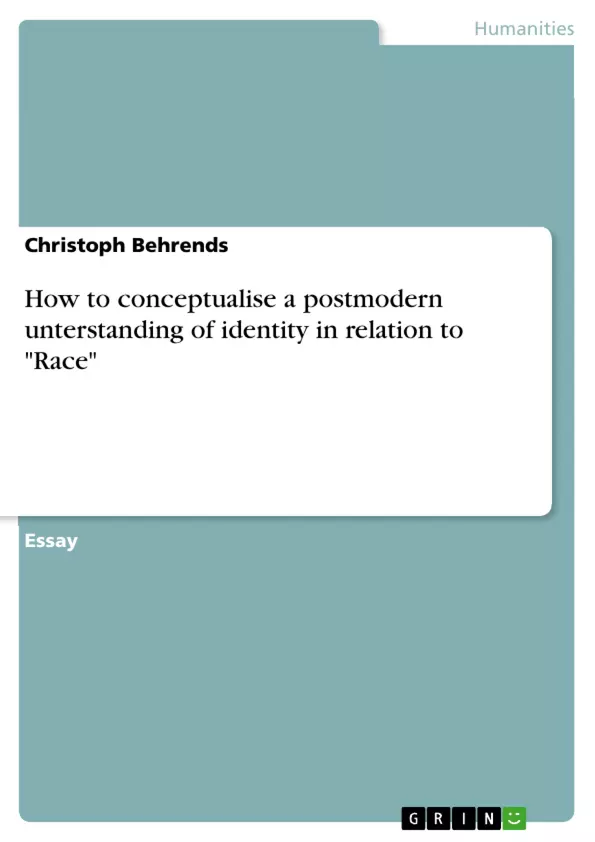The issue about “race” is still of great significance in today’s societies. Recent incidents like racist slurs at football games show how deep racist tendencies are still embedded in people’s minds – in spite of consistent awareness raising and information. However, these examples show only the peak of racist tendencies. Racial imagery in media and arts is central to the organisation of the modern world (Dyer 1997: 1). Furthermore, the scientific “foundation” of theories of “race” continues to be a disputed question for biology as well as for the social sciences (Lang 2000: x).
This essay is about the implications of the term “race” and the coherence of “race” and identity. It implements a postmodern approach to the understanding of identity and applies this concept to the representation of "the other" in a recent newspaper article.
Table of Contents
- Introduction
- Definition of terms
- Postmodernism
- Identity
- Race
- Two Perspectives - Constructionism versus Essentialism
- Race as a social construct
- The Structure of Identity
- Racialisation
- Two Sorts of Racism
- Whiteness
- Characteristics of a postmodern Understanding of Identity in relation to “Race”
- A contemporary example
Objectives and Key Themes
This essay aims to explore the complexities of "race" and identity through a postmodern lens. It seeks to define key terms like postmodernism, identity, and race, and to analyze how these concepts intersect and influence each other. The essay also examines contrasting perspectives on race – constructionism versus essentialism – and delves into the social construction of race, the structure of identity, and the manifestation of racism in contemporary society.
- Defining postmodernism, identity, and race.
- Analyzing the social construction of race.
- Exploring the relationship between identity and race within a postmodern framework.
- Examining different forms and manifestations of racism.
- Applying postmodern theory to understand contemporary racial issues.
Chapter Summaries
Introduction: This introductory chapter establishes the continued relevance of "race" in contemporary society, citing examples of racist behavior to highlight the persistence of racist attitudes. It introduces the essay's central focus on the implications of "race," its relationship to identity, and its analysis through a postmodern framework. The chapter also emphasizes the need to define key terms while acknowledging the limitations of abstract classifications like "race," "class," "gender," and "sexuality" in fully capturing individual differences.
Definition of terms: Postmodernism: This section delves into the multifaceted nature of postmodernism, acknowledging the diversity of interpretations. It highlights core postmodern ideas such as the de-centeredness of meaning, the importance of local perspectives, the multiplicity of human existence, and the blending of diverse cultures and viewpoints. The discussion includes the debate surrounding the existence and implications of postmodernism, its rejection of universal truths, and its emphasis on the social construction of the individual. The section also touches upon the impact of postmodernism on sociology, referencing key figures and methodologies that have shaped the field.
Definition of terms: Identity: This section presents various definitions of "identity," highlighting its diverse interpretations ranging from the distinct personality of an individual to the characteristics by which a person or thing is recognized. The sociological implications of identity are explored, focusing on the construction of a homogeneous concept of the self and its representation. The chapter connects the emergence of postmodernism to shifts in understanding identity, contrasting the more open and dynamic view of modern identity with the fluid and multiple nature of postmodern identity. This shift is linked to societal changes in community, workplace, nation, and globalization.
Keywords
Postmodernism, identity, race, social construction, racism, essentialism, constructionism, power structures, situated knowledge, deconstruction, contemporary examples.
FAQ: A Postmodern Understanding of Identity in Relation to "Race"
What is the purpose of this essay?
This essay explores the complexities of "race" and identity through a postmodern lens. It aims to define key terms, analyze how these concepts intersect, and examine contrasting perspectives on race (constructionism vs. essentialism). It delves into the social construction of race, the structure of identity, and manifestations of racism in contemporary society.
What are the key themes covered in the essay?
Key themes include defining postmodernism, identity, and race; analyzing the social construction of race; exploring the relationship between identity and race within a postmodern framework; examining different forms of racism; and applying postmodern theory to understand contemporary racial issues.
What topics are covered in the Table of Contents?
The Table of Contents includes an introduction, definitions of postmodernism, identity, and race; a comparison of constructionism and essentialism; race as a social construct; the structure of identity; racialization; two sorts of racism; whiteness; characteristics of a postmodern understanding of identity in relation to "race"; and a contemporary example.
How are postmodernism, identity, and race defined in the essay?
Postmodernism is defined by its de-centeredness of meaning, focus on local perspectives, multiplicity of human existence, and blending of cultures. Identity is explored through various definitions, highlighting its diverse interpretations and sociological implications, particularly in the context of a postmodern, fluid understanding of self. Race is analyzed as a social construct, challenging essentialist views.
What are the main perspectives on race discussed?
The essay contrasts constructionism (race as a socially created concept) and essentialism (race as having inherent biological meaning). It primarily focuses on the social constructionist perspective.
What are the chapter summaries?
The introduction establishes the continued relevance of "race" and its relationship to identity within a postmodern framework. The definition of terms sections delve into the complexities of postmodernism and identity, highlighting their multifaceted nature and implications for understanding race.
What are the keywords associated with the essay?
Keywords include Postmodernism, identity, race, social construction, racism, essentialism, constructionism, power structures, situated knowledge, deconstruction, and contemporary examples.
- Citation du texte
- Christoph Behrends (Auteur), 2005, How to conceptualise a postmodern unterstanding of identity in relation to "Race" , Munich, GRIN Verlag, https://www.grin.com/document/82676



